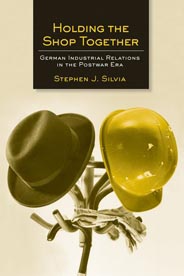
Holding the Shop Together
Dr. Stephen Silvia is a Professor at American University's School of International Service where he teaches comparative industrial relations, comparative politics, international economics, and international trade relations. He is widely respected for his research and analysis on the German economy with an emphasis on German industrial relations. His writings offer valuable insights into the practical aspects of German industrial relations and business practices, insights that are useful to readers who are more accustomed to the business and economic orientation that prevails in other countries.

Holding the Shop Together provides an in-depth account of the German industrial relations system that is generally credited for the consistent success of the German economy during the post-war era. The book examines how that country's framework of trade unions and employers associations has influenced the broader economy, and how this system has remained a focal point for stability during periods of economic fluctuation and transformation.
Stephen Silvia follows the development of the "social partnership" between labor and management, and the widespread support for labour laws and institutions of industrial relations that have shaped the German economy. Recent reductions in union membership and declines in the participation in employers associations have had little impact on the consensus model of labour-management relations that continues to guide industrial decision making. The role of work councils and of employee representatives on supervisory boards has enabled businesses to adapt to changing market conditions without the disruptions often found in other economies, thereby Holding the Shop Together.
While considering the future of German industrial relations, Stephen Silvia examines how innovative strategies implemented by both management and labour have helped to reverse the declines in membership of traditional institutions, and how extensive changes within labour unions and employers associations have lent a new impetus to both the unions and businesses. Despite these reductions in membership, Holding the Shop Together demonstrates that traditional industrial relations have remained intact, extending into the boardrooms, workplaces, the government, and to the German economy as a whole.




